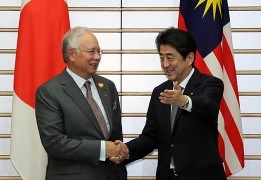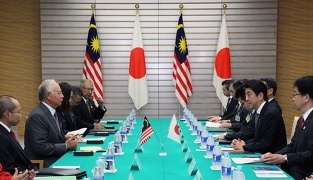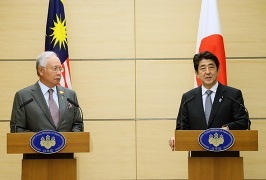|
|
| Bilateral
Relations
> Japan-Malaysia Summit Meeting |
| Japan-Malaysia Summit Meeting |
|
May 23,
2014
   (Photo: Cabinet Public Relations Office) On May 21, commencing at 7:05 p.m. for approximately 35 minutes, Mr. Shinzo Abe, the Prime Minister, held a meeting with Dato’ Sri Haji Mohd Najib bin Tun Haji Abdul Razak, Prime Minister and Minister of Finance of Malaysia, who was on his working visit to Japan. An overview of the meeting is as follows: 1 Opening remarks At the outset, Prime Minister Abe extended his deepest condolences on the demise of the brother of His Majesty The Yang di-Pertuan Agong of Malaysia XIV, in the early hours of the day. Prime Minister Abe also welcomed Prime Minister Najib’s visit to Japan. Expressing sympathy for the missing Malaysia Airlines flight, Prime Minister Abe stated that the Government of Japan was ready to provide further assistance if needed. Prime Minister Abe also expressed his intention to further strengthen the bilateral cooperative relationship with Malaysia, incoming ASEAN Chair for next year, in a wide range of areas, including regional issues. Prime Minister Najib expressed his deep gratitude for Japan’s support and cooperation in the search efforts for the missing Malaysia Airlines plane. Prime Minister Najib also shared the intention to further deepen the cooperative relationship between the two countries, including through cooperation on the Look East Policy 2.0. 2 Bilateral relations (1) Prime Minister Abe explained that the Government of Japan has set out the Three Principles on Transfer of Defense Equipment and Technology and was deliberating the relationship between the right to collective self-defense and constitution as part of the “Proactive Contribution to Peace” based on the principle of international cooperation. (2) Moreover, Prime Minister Abe expressed his hope to expand security cooperation with Malaysia, particularly through enhanced cooperation in human resource development and equipment in the field of maritime security. Building on the existing cooperative relationship between the two countries’ coast guard agencies, the two leaders shared their views on stepping up maritime safety cooperation, including possible cooperation on human resource development for ASEAN maritime safety. The two leaders also shared their intention to step up defense cooperation, including through the exchanges between the two countries’ defense authorities, while seeking ways to enhance defense cooperation, including creating a new framework for security dialogue. (3) On the economy, Prime Minister Abe reiterated Japan’s support for Malaysia’s efforts to achieve its developed nation status by 2020, a target set by Prime Minister Najib. Prime Minister Najib expressed his expectation for more Japanese companies to participate in Malaysia’s projects such as energy-related projects. Prime Minister Abe reiterated Japan’s interest to see its Shinkansen system being adopted for the Malaysia-Singapore high-speed railway project. In response, Prime Minister Najib stated that he would welcome the participation of Japanese companies in the bidding. (4) On the Look East Policy 2.0, Prime Minister Abe welcomed the progress in the discussions to establish a framework for bilateral consultations which was agreed on last December. Underlining that the Look East Policy 2.0 would mark a new era for Japan-Malaysia partnership, the two leaders pledged to continue to work together to identify the best way to enhance cooperation. 3 Regional and international situation (1) Prime Minister Abe reaffirmed Japan’s intention to have close coordination with Malaysia, the incoming ASEAN Chair for 2015. The two leaders renewed their commitment to work closely toward the establishment of the ASEAN Community in 2015. (2) The two leaders exchanged views on the current regional situation including the situation in the South China Sea. Prime Minister Abe explained Japan’s basic stance including the importance of adherence to the rule of law in maintaining peace and stability in the region, while commending ASEAN’s united response to the situation. The two leaders underscored the importance of ASEAN taking a united stance on this issue and of dealing with the situation in accordance with international law. (3) On the Trans-Pacific Partnership (TPP), the two leaders affirmed the importance of an early conclusion. |